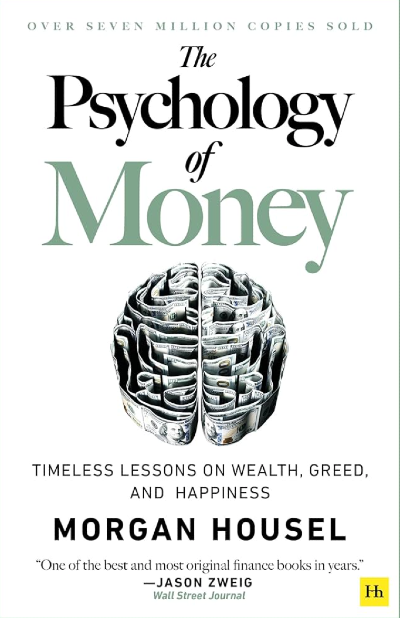📚 Book Review: The Psychology of Money

Author: Morgan Housel
Read if you're into: behavioral finance tips and learning about investment and wealth management principles
Why the most important part of your financial life might be your mindset.
If you've ever looked at your bank account and thought, "I should know what I'm doing by now", Morgan Housel is here to assure you: it's not about knowledge. It's about behavior. And behavior is messy, emotional, inconsistent... Human.
The Psychology of Money is not your typical personal finance book. There are no budgeting spreadsheets. No secret hacks. No “Top 10 Index Funds to Buy Before You're 40.” Instead, Housel delivers a series of short, punchy chapters that feel more like life lessons disguised as financial truths. And he manages to strike a balance: intelligent but accessible, wise without being preachy.
A Few Ideas That Shifted How I Think:
1. “You can be risk-loving and completely averse to ruin.”
You don’t need to live in fear to be cautious — you just need to respect the possibility that things break, markets crash, and plans don’t go to plan. It’s not paranoia. It’s survival. It’s margin of safety. And it’s one of the most under-appreciated forces in personal finance.
2. Getting rich ≠ staying rich
Turns out, those are two very different skill sets. The first often requires boldness. The second requires humility. Frugality. The discipline to not believe your own hype. It reminded me of how many financial "success stories" eventually end in flameouts — not because they didn't know what to do, but because they assumed past success meant future immunity.
3. Reputation, freedom, and happiness? Invaluable. You could argue this is the actual core of the book.
“Being loved by those you want to love you is invaluable.”
It reframes wealth. Not as what’s in your portfolio, but in how you spend your time. Who you get to spend it with. And whether or not you actually have the freedom to say no.
🧠 Mental Models & Self-Awareness: Understanding the Game You’re Playing
“Few things matter more with money than understanding your own time horizon and not being persuaded by the actions and behaviors of people playing different games than you are.” (p. 173)
So much bad decision-making comes from mimicking others who are on a completely different path—whether they’re day traders, FIRE movement purists, or crypto evangelists. Your financial life isn’t theirs. Know your time horizon, and play your game.
“We should also come to accept the reality of changing our minds.” (p. 153)
Housel reminds us that growth often means letting go of outdated beliefs. In a world that changes fast, stubbornness isn’t strategy. Adaptability is.
⚖️ Risk, Bias, and the Invisible Enemies of Good Decisions
“Asymmetric aversion to loss is an evolutionary shield.” – Kahneman (p. 181)
Our brains are wired to react more strongly to loss than to gain. It’s not weakness—it’s survival instinct. But recognizing it can help us respond more rationally.
“The more you want something to be true, the more likely you are to believe a story that overestimates the odds of it being true.” (p. 193)
Motivation bias is real. The stronger the desire, the more dangerous the illusion. In investing, that’s a recipe for bubbles and bad bets.
“Risk is what’s left over when you think you’ve thought of everything.” – Carl Richards (p. 200)
No model, spreadsheet, or backtest will ever fully account for reality. Room for error isn’t a luxury—it’s a necessity. A lesson I learned in one of my investments classes in school was "the market can stay irrational longer than you can stay solvent." As mentioned before, keep yourself playing the game for long enough with a strategy that works for you.
“You can be wrong half the time and still make a fortune.” (p. 208)
The goal isn’t to be perfect. It’s to stay in the game long enough to let the good bets compound.
Other Takeaways Worth Highlighting:
- Luck and risk are twins — You can’t believe in one without respecting the other.
- Cash is an insurance policy — If it keeps you from panic-selling at the bottom, its “low return” isn’t so low after all.
- Failure is normal — Most things don’t work. But the few that do can more than make up for it. “Tails drive everything.”
- Market volatility is a fee, not a fine — It’s the price of admission. Accept it or stay out of the game.
- Wealth is what you don’t see — The flashy stuff? That’s spending. Real wealth is the unspent money. The freedom cushion.
Final Thoughts
As its name suggests, this book is focused more on the psychology of money, personal finances, and investing. It won't give you a budget with line items and how to optimize your back-door IRA. Everyone's strategy is different. It’s trying to get you to pause. To think about why you spend, how you invest, and what you’re actually trying to get out of your money.
Because at the end of the day, we’re storytellers. And money? It's just one of the loudest and most influential stories we tell.
So if you’re looking for some helpful reframes on your financial outlook, this one’s worth your time. You might not walk away with a new investing strategy, but it'll help illuminate mental barriers, biases, and actions you might've subconsciously taken that were driven by your financial programming. You'll walk away with a clearer lens on how money really works... and how you really work around money.




